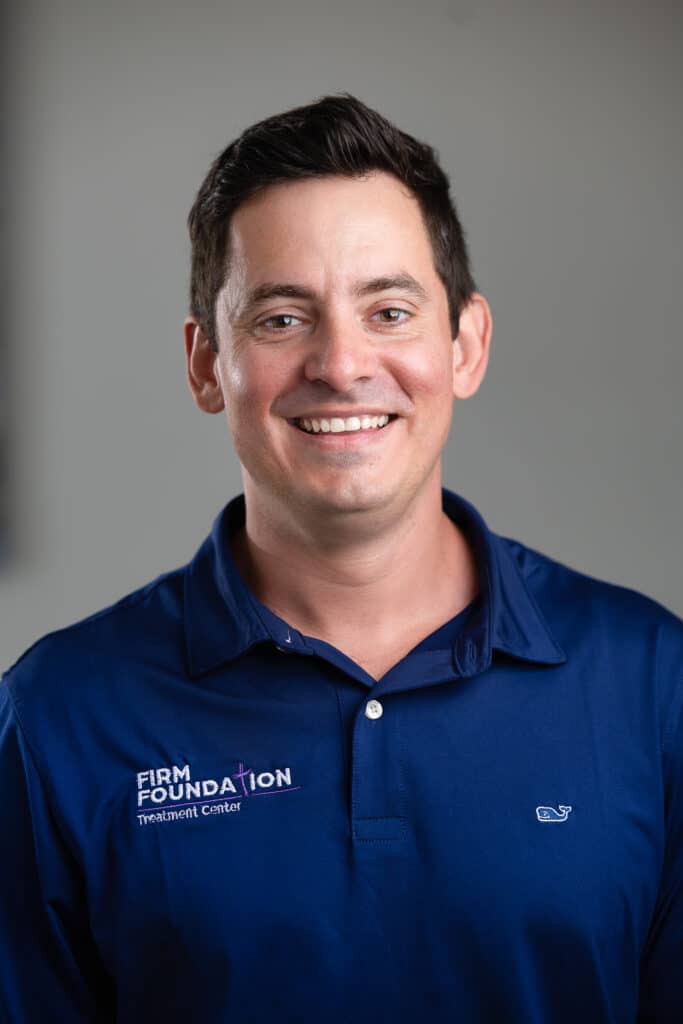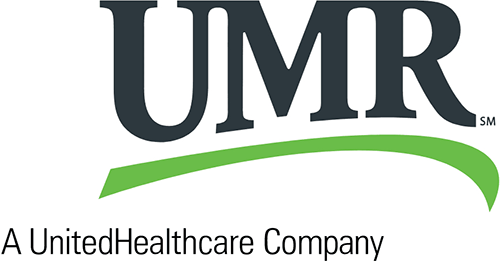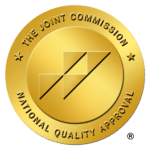“And the God of all grace, who called you to his eternal glory in Christ, after you have suffered a little while, will himself restore you and make you strong, firm and steadfast.”
Peter 5:10
Flexible Care Through Our Intensive Outpatient Program (IOP) near Atlanta, GA
The Intensive Outpatient Program (IOP) at Firm Foundation Treatment Center near Atlanta, GA, is designed for men who have completed a higher level of care, such as our Partial Hospitalization Program (PHP), or for those who need ongoing support but do not require daily, full-time treatment. IOP provides a structured, Christ-centered treatment environment while allowing clients to maintain their responsibilities at home, work, or school.
Through our evidence-based approach, IOP integrates therapies such as Cognitive Behavioral Therapy (CBT), Dialectical Behavior Therapy (DBT), Motivational Interviewing (MI), Relapse Prevention, Family Systems Therapy, Eye Movement Desensitization and Reprocessing (EMDR), and Art Therapy to support long-term sobriety. Our Christ-centered approach helps clients align their recovery journey with their faith, ensuring spiritual and emotional growth.
What is the Intensive Outpatient Program (IOP)?
IOP is a flexible outpatient treatment option that allows clients to receive high-quality addiction treatment while continuing to manage daily responsibilities. Clients attend therapy sessions several times a week, focusing on relapse prevention, emotional regulation, and personal growth. IOP is ideal for men who are transitioning from more intensive treatment programs, such as PHP, or for those who are further along in their recovery and need ongoing support to maintain their sobriety.
At Firm Foundation Treatment Center, our IOP combines evidence-based therapies with faith-based support, ensuring that clients receive comprehensive care for their mind, body, and spirit. The program typically involves therapy sessions three to five days a week, with the flexibility to attend morning or evening sessions.
Dual Diagnosis Treatment in Our IOP Program
At Firm Foundation Treatment Center, we address co-occurring disorders through our comprehensive dual diagnosis treatment programs. This type of treatment helps individuals who are dealing with mental health disorders alongside addiction by creating an integrated addiction and mental health treatment plan that takes individual needs into account. By acknowledging the connection between the two disorders, an individual can develop more effective coping skills for maintaining sobriety and create techniques for managing symptoms of a mental health condition in a healthy manner.
Cognitive Behavioral Therapy (CBT) in IOP
Cognitive Behavioral Therapy (CBT) is a core component of our IOP, providing clients with practical tools to manage their thoughts, feelings, and behaviors. Addiction often stems from negative thinking patterns, and CBT helps clients identify these patterns and replace them with healthier ones.
How CBT Supports Recovery in IOP:
- Identifying Cognitive Distortions: CBT helps clients recognize the harmful thoughts that contribute to substance use, such as feelings of hopelessness or self-doubt.
- Developing Healthier Thought Patterns: Clients learn to challenge irrational beliefs and replace them with more realistic, positive thoughts that support sobriety.
- Building Coping Mechanisms: CBT provides clients with effective strategies to handle cravings, stress, and high-risk situations without resorting to drugs or alcohol.
Dialectical Behavior Therapy (DBT) in IOP
Dialectical Behavior Therapy (DBT) focuses on helping men regulate their emotions, tolerate distress, and improve their relationships. DBT is particularly beneficial for individuals who struggle with intense emotions or impulsive behaviors, both of which can increase the risk of relapse.
How DBT Supports Recovery in IOP:
- Emotional Regulation: DBT helps clients manage their emotions in healthy ways, reducing the likelihood of turning to substances to cope with stress or anxiety.
- Distress Tolerance: Clients learn how to tolerate and navigate difficult emotions and situations without resorting to substance use, reducing the risk of relapse.
- Mindfulness Practices: DBT incorporates mindfulness techniques to help clients stay present and focused on their recovery, improving self-awareness and emotional stability.
Motivational Interviewing (MI) in IOP
Motivational Interviewing (MI) is a client-centered approach designed to enhance an individual’s motivation to change. It is especially useful for men who may still feel ambivalent about their recovery or are struggling to maintain motivation.
How MI Supports Recovery in IOP:
- Exploring Ambivalence: MI helps clients explore their mixed feelings about sobriety and resolve any doubts they may have about their ability to stay sober.
- Building Self-Efficacy: Through MI, clients gain confidence in their ability to overcome addiction by focusing on their strengths and past successes.
- Strengthening Commitment to Change: MI fosters a sense of personal responsibility and helps clients strengthen their commitment to long-term recovery.
Relapse Prevention in IOP
Relapse Prevention is a central focus of our IOP, as clients in this stage of recovery need to develop strategies for maintaining their sobriety in everyday life. Our relapse prevention sessions teach clients how to identify triggers, manage cravings, and build a support system to prevent relapse.
How Relapse Prevention Supports Recovery in IOP:
- Identifying Triggers: Clients work with their therapist to identify the specific people, places, and situations that trigger cravings or stress.
- Creating a Relapse Prevention Plan: Each client creates a personalized plan that outlines coping strategies and steps to avoid or manage triggers.
- Building Resilience: Relapse prevention focuses on developing emotional resilience, helping clients navigate stressful situations without turning to substances.
Family Systems Therapy in IOP
Family Systems Therapy helps clients and their families heal from the effects of addiction. Addiction impacts the entire family unit, and addressing unhealthy family dynamics is essential for long-term recovery. Our Christ-centered approach to Family Systems Therapy helps families build healthier relationships, improve communication, and create a supportive environment for recovery.
How Family Systems Therapy Supports Recovery in IOP:
- Improving Communication: Family Systems Therapy teaches clients and their loved ones how to communicate openly and honestly, reducing conflict and misunderstandings.
- Healing Family Relationships: The program provides a space for family members to heal and rebuild trust, strengthening the support system around the individual in recovery.
- Setting Healthy Boundaries: Family Systems Therapy emphasizes the importance of setting healthy boundaries, allowing clients and their families to maintain supportive relationships without enabling harmful behaviors.
Eye Movement Desensitization and Reprocessing (EMDR) in IOP
Eye Movement Desensitization and Reprocessing (EMDR) is a therapeutic approach that helps individuals process and heal from trauma. Many men struggling with addiction have unresolved trauma that contributes to their substance use. EMDR provides a safe, structured way to work through these traumatic memories and reduce their emotional impact.
How EMDR Supports Recovery in IOP:
- Processing Traumatic Memories: EMDR helps clients reprocess traumatic experiences that may trigger substance use, reducing their emotional intensity and helping clients gain control over their reactions.
- Reducing Triggers: By addressing the root causes of addiction, such as trauma, EMDR helps clients become less reactive to emotional triggers and more equipped to manage cravings.
- Building Emotional Stability: As clients heal from trauma through EMDR, they gain emotional stability and develop healthier ways to cope with stress and anxiety.
Art Therapy in IOP
Art Therapy offers clients a creative and expressive outlet for exploring their emotions and processing their recovery journey. Through the creative process, clients can access feelings that may be difficult to verbalize, helping them gain insight into their emotions and behaviors.
How Art Therapy Supports Recovery in IOP:
- Non-Verbal Expression: Art Therapy allows clients to express their feelings and experiences in a non-verbal way, providing a new perspective on their recovery.
- Processing Emotions: Through creative expression, clients can explore and process difficult emotions, reducing the risk of emotional overwhelm and relapse.
- Building Self-Esteem: Art Therapy encourages personal growth and self-expression, helping clients build confidence and self-worth as they progress in their recovery.
Christ-Centered Healing in IOP
At Firm Foundation Treatment Center, our IOP integrates faith-based support into every aspect of treatment. We believe that true healing comes from addressing the mind, body, and spirit, and our Christ-centered approach helps men strengthen their relationship with God as they continue their recovery journey.
- Incorporating Prayer and Reflection: Clients are encouraged to incorporate prayer and spiritual reflection into their daily routine, finding strength and guidance through their faith.
- Spiritual Counseling: Our IOP offers opportunities for spiritual growth, such as Bible study and spiritual counseling, helping clients reconnect with their faith as they work toward healing.
- Strengthening Faith in Recovery: By integrating faith into therapy, clients are able to draw on their spiritual beliefs as a source of strength, helping them stay grounded in their recovery.
Why Choose Firm Foundation Treatment Center for IOP?
Firm Foundation Treatment Center is dedicated to providing comprehensive, Christ-centered care for men in recovery. Our IOP offers a structured environment with flexible scheduling where clients can receive the support they need while maintaining their daily responsibilities.
- Experienced Therapists: Our team of licensed therapists is highly trained in evidence-based therapies, such as CBT, DBT, and EMDR, ensuring that clients receive the highest quality of care.
- Christ-Centered Healing: We integrate faith into every aspect of our IOP, helping clients strengthen their spiritual connection as they continue their recovery journey.
- Personalized Treatment Plans: We tailor our IOP to meet the unique needs of each client, providing individualized care that supports their personal recovery goals.
Recovery from addiction is a transformative and uplifting journey, characterized by various stages that each present unique opportunities for personal growth, healing, wellness, and community support. For individuals transitioning from more intensive levels of care, a faith-based Intensive Outpatient Program serves as a crucial bridge, striking the ideal balance between the structure necessary for recovery and the flexibility required to navigate everyday life.
At Firm Foundation in Woodstock, GA, our IOP is designed to provide comprehensive, addiction care that focuses on the individual’s recovery process and deepens their spiritual relationship with God. This holistic approach encourages participants to engage in meaningful self-reflection and develop a renewed sense of purpose.
Our program includes a variety of therapeutic modalities, group therapy sessions, and individual counseling, all within a supportive environment that nurtures faith and resilience. The goal is to empower individuals to sustain their recovery while actively participating in their communities and reconnecting with their values.
As participants progress through the IOP, they experience a healing journey that fosters hope, personal accountability, and transformative life skills, preparing them for a fulfilling and balanced life beyond addiction. Each step is supported by a dedicated team of professionals who understand the complexities of recovery and are committed to guiding individuals toward lasting health and spiritual fulfillment.
The Importance of Faith in Addiction Treatment
Addiction is not just a physical or psychological challenge—it can be a profound spiritual journey. Many individuals facing substance use disorders may feel a sense of emptiness or guilt, but there is hope for renewal that transcends traditional methods. At Firm Foundation, we believe true healing and freedom come through the incredible power of Christ.
Faith-based recovery provides a transformative approach that addresses the spiritual aspects of addiction. Through God’s grace and mercy, individuals can discover:
- Forgiveness: Christ’s love brings redemption, allowing individuals to release shame and embrace their beautiful new identity in Him.
- Strength: While recovery may present challenges, leaning on the Holy Spirit empowers individuals to rise above temptation and overcome obstacles.
- Purpose: Addiction often clouds one’s sense of purpose, but aligning with God’s plan helps individuals rediscover meaning and direction in their lives.
At Firm Foundation, our Intensive Outpatient Program (IOP) uniquely blends Christ-centered principles with proven therapy methods, fostering a holistic recovery experience. Clients learn to trust in God’s promises, embrace His strength, and build a solid recovery foundation rooted in faith. Together, we can embark on a hopeful journey to lasting recovery and fulfillment.
The Role of IOP in a Step-Down Treatment Approach
An Intensive Outpatient Program (IOP) plays an essential role in the journey of addiction recovery. It acts as a supportive transition for individuals who have successfully completed inpatient or partial hospitalization programs (PHP), providing them with a structured environment to thrive.
IOP is perfect for those who:
- Have reached a commendable level of stability in their recovery and are eager to continue their growth with ongoing therapy and accountability.
- Are transitioning back to work, school, or family life, all while receiving valuable treatment.
- Seek the flexibility of outpatient care while still benefiting from a nurturing recovery framework.
At Firm Foundation, our faith-based IOP is designed to empower clients, helping them sustain their progress and seamlessly integrate the skills they’ve developed into their everyday lives.
Benefits of Faith-Based IOP at Firm Foundation
Our Intensive Outpatient Program is carefully designed to support individuals at this critical stage of recovery.
Christ-Centered Curriculum
At Firm Foundation, we joyfully place Christ at the heart of our mission. Our IOP features uplifting spiritual counseling, engaging Bible study, and the inspiring Celebrate Recovery program, guiding clients to embrace God’s purpose in their lives. Through prayer, worship, and community support, individuals flourish in their relationship with Christ, gaining the strength and encouragement needed for their recovery journey. This spiritual renewal serves as a powerful foundation for meaningful and lasting transformation.
Flexible and Accessible Care
Our IOP empowers clients to thrive by balancing therapy and recovery sessions alongside work, school, and family life. With sessions held several times a week, participants benefit from essential structure and support, fostering their ongoing recovery journey without the need for full-time inpatient care.
Evidence-Based Therapies
Our IOP embraces a holistic approach by incorporating faith-based practices alongside evidence-based therapies. Cognitive Behavioral Therapy empowers clients to transform negative thought patterns and unlock their potential for change. Trauma-informed care supports healing from past experiences that can impact well-being. Relapse Prevention Strategies equip clients with practical tools to handle triggers confidently. By blending these effective methods with Christ-centered principles, we create a supportive program that nourishes the physical, emotional, and spiritual dimensions of recovery.
Supportive Community
Recovery is a journey best embarked upon together! At Firm Foundation, our IOP clients thrive in a vibrant, Christ-centered community of peers and mentors who uplift one another through shared faith and dedication to healing. Engaging in group therapy, Celebrate Recovery meetings, and fellowship activities cultivates connection, accountability, and encouragement. This nurturing environment empowers clients to feel understood and supported as they embrace the transforming experience of early recovery.
Family Involvement
Addiction affects not only individuals but also their loved ones. Our IOP offers valuable opportunities for family involvement, including counseling sessions and weekly visits, to nurture relationships, restore trust, and enhance the client’s support network. Together, we can create a brighter future!
How Firm Foundation Can Help
Firm Foundation is more than a treatment center—we are a Christ-centered community dedicated to helping individuals find freedom from addiction through faith, compassion, and evidence-based care. Here’s how we can support you or your loved one:
A Holistic Approach to Recovery
We understand that addiction affects every aspect of a person’s life. Our IOP addresses the physical, emotional, and spiritual dimensions of recovery, ensuring that clients receive comprehensive care that promotes lasting transformation.
Personalized Treatment Plans
Each recovery journey is a wonderful opportunity for growth! We create personalized treatment plans that reflect each client’s unique needs and aspirations. Our dedicated team collaborates closely with clients to craft a successful roadmap that honors their faith and values, paving the way for a brighter future.
Emphasis on Long-Term Success
At Firm Foundation, we are dedicated to breaking the cycle of rehab and recovery. Our IOP empowers clients with essential skills, tools, and a strong spiritual foundation, ensuring they not only maintain sobriety but also flourish in their vibrant new lives.
Testimonial
“The IOP at Firm Foundation gave me the flexibility I needed while still providing the support to stay on track with my recovery. The combination of therapy and faith has made a huge difference in my life, and I feel stronger and more confident every day.” — David, 36, Woodstock, GA
Get Started with IOP near Atlanta
If you or a loved one is seeking ongoing support for addiction recovery, the Intensive Outpatient Program (IOP) at Firm Foundation Treatment Center offers flexible, Christ-centered care. With evidence-based therapies like CBT, DBT, EMDR, and more, our IOP helps men maintain sobriety while managing their responsibilities. Contact us today to learn more about how IOP can support your recovery journey.













